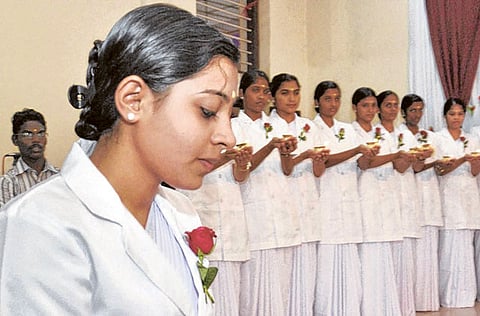Kerala nurses' strike grows
Strike spreads across Kerala, with clashes reported in neighbouring areas

Thiruvananthapuram: They have affectionately been called modern-day Florence Nightingales and no one has doubted their integrity in service.
Wearing white overalls, they have fanned out across hospitals around the world, from Bonn to Birmingham and Houston to Haiti.
But Kerala's nurses, the apparent darlings of medical establishments almost anywhere else, are now demanding medication for some of the ills they feel have remained long unresolved, namely a decent salary, acceptable welfare measures and freedom from work bonds.
When nurses struck work in Mumbai, Delhi and Kolkata last year, the media arc lights did focus on their plight, but when the strike crossed state borders and reached Kerala, there appeared to be complete confusion. Neither the media nor the political leadership seemed concerned, even as internet blogs accused media houses as well as politicians of vested interests in denying attention to nurses' demands.
But the strike has now spread across the state, incidents of clashes have been reported from places as distant as Kollam and Kochi, and the protests have reached a crescendo that can no longer be silenced. And when the strike reached hospitals as reputed as the Amrita Institute and Lakeshore Hospital in Kochi and the MOSC Medical College, Kolenchery, the nurses knew they had gathered enough momentum for a victory push.
In a state which has taken pride in socio-political struggles during the Independence movement, it seemed odd for some time that no one was openly supporting the nurses' cause. But having sensed the momentum the nurses' strike has achieved, and betting on some gains, organisations and parties have come around to support the strike.
Seriousness of issue
Last week, Chief Minister Oommen Chandy himself acknowledged the seriousness of the issue, stating that the "government is firm that private hospitals should pay minimum wages to nurses and paramedical staff". Fielding questions from media persons on the threat of some hospital managements to close down hospitals if nurses did not fall in line, Chandy said: "The minimum wage is the law of the land. It has to be paid."
That statement should sound odd to those who know about the situation in Kerala, where tens of thousands of north Indian labourers are employed tin building construction and catering, and as farm and factory labourers.
If all of those migrant workers get paid the wages they demand, and the nurses do not, it must be because of Keralites' fancy for white-collar jobs, according to some social scientists. Others say that the problem may also be due to the excess supply of nurses. It is estimated that some 9,000 nurses pass out of nursing institutions in the state each year, and double that number turn out from institutions outside Kerala. A majority of them end up seeking jobs in the state, thereby depressing salary levels.
Shibu Baby John, Kerala's labour minister, is co-ordinating with the labour department to resolve the crisis, but a solution seems far. On one side are the United Nurses' Association led by Jasmine Shah and the Trained Nurse Association of India, and on the other private hospital managements across the state. Interestingly, religious denominations of all hues run hospitals in Kerala and nurses allege that the working conditions are the same in almost all these hospitals.
The animosity between the two sides has reached such levels that the Lakeshore Hospital in Kochi, where the nurses are on strike, got a high court order for police protection to ensure the hospital's normal functioning.
Half-hearted attempt
The court directed the Kolenchery hospital to state whether it has complied with the 2009 government notification on minimum wages for nurses, and asked the hospital authorities to provide the nurses space within the campus for peaceful protests.
Discussions so far have been mostly half-hearted, and the situation got further muddled when the Kerala Private Hospitals' Association blamed the government for the prolonged strike. P.K. Mohammad Rashid, the association president, warned of action including closure of hospitals for a day if the issue was not solved in a fortnight. The association thinks the government has not listened to the woes of the managements.
A glimmer of hope came from Kannur last week when the strike at the Ancharakandi hospital was resolved after the management promised minimum wages to be paid with retrospective effect for three months. But elsewhere in the state, no resolution is in sight.
Sign up for the Daily Briefing
Get the latest news and updates straight to your inbox



